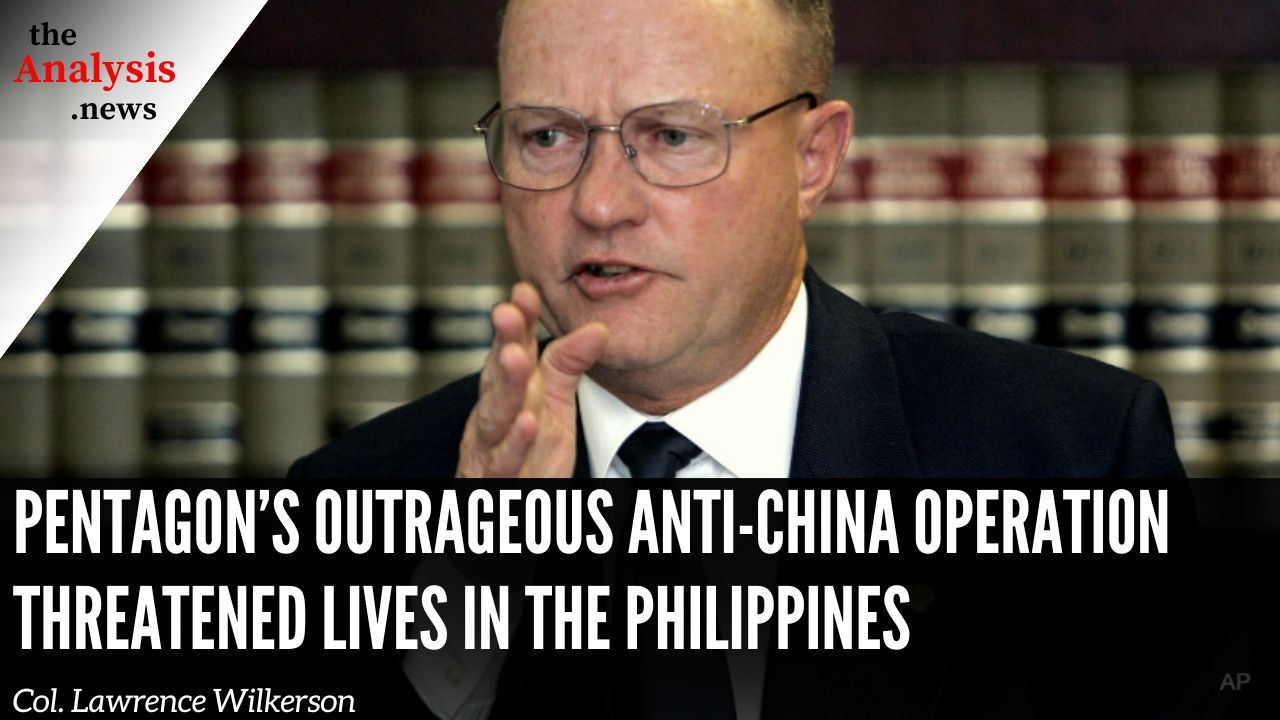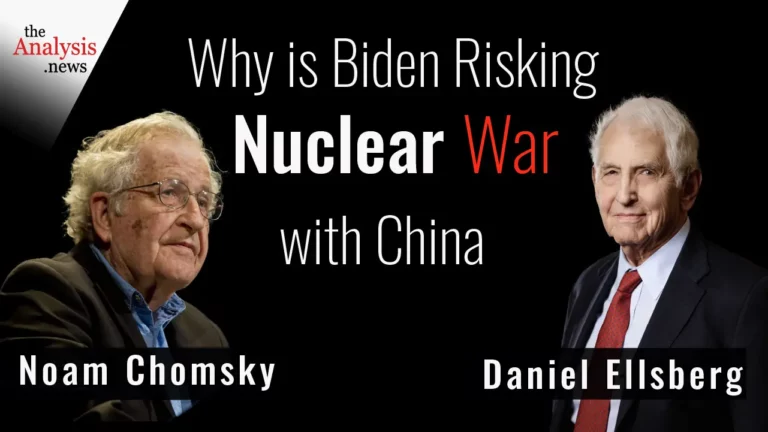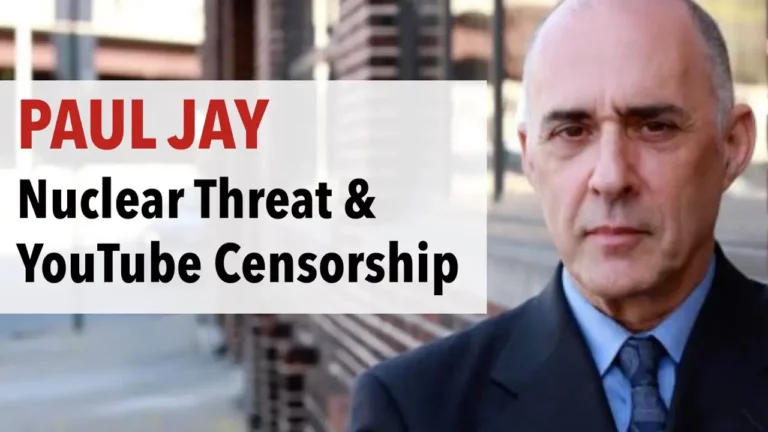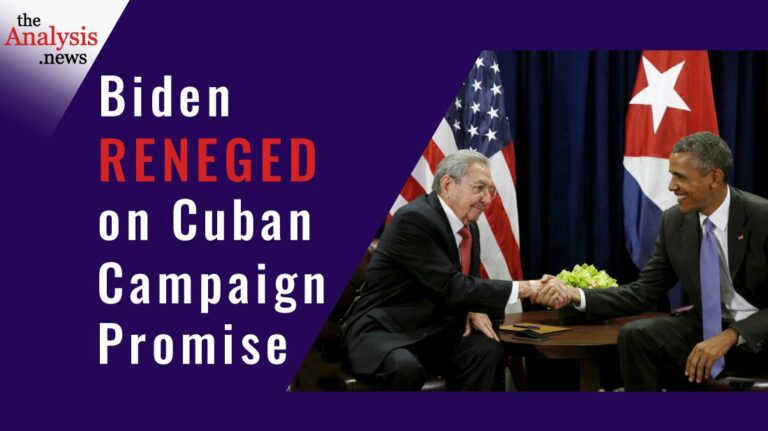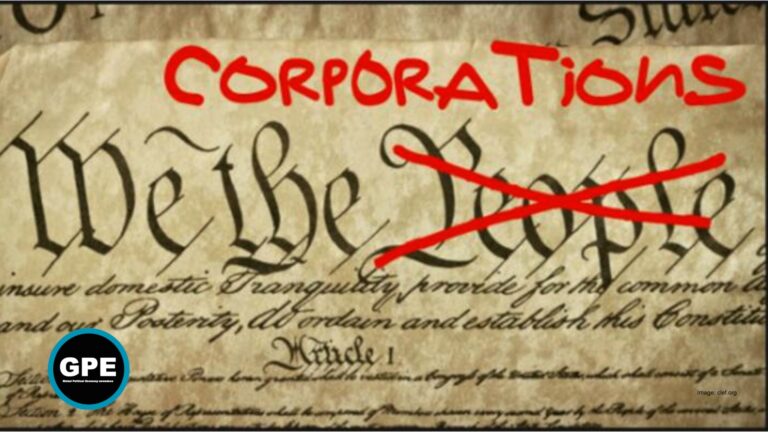Pentagon’s Outrageous Anti-China Operation Threatened Lives in the Philippines – Col. Larry Wilkerson
A recent Reuters investigation uncovered a scandalous Pentagon operation that sought to discredit the Chinese Sinovac vaccine and sow distrust among the population in the Philippines towards China. Col. Larry Wilkerson discusses previous unlawful Strategic Information Operations (SIOs) launched by the Pentagon and the particular depravity of this operation initiated in Spring 2020 under President Trump’s administration, at a time when countries such as the Philippines did not possess their own vaccine manufacturing capacity and were accepting a free supply of vaccines from China.
Talia Baroncelli
Hi, you’re watching theAnalysis.news, and I’m your host, Talia Baroncelli. Today, I’ll be joined by Col. Lawrence Wilkerson. We’ll be speaking about a Reuters investigation into a Pentagon anti-vax campaign targeting the Philippines.
If you’d like to support the work that we do, you can go to our website, theAnalysis.news, and hit the donate button at the top right corner of the screen. Most importantly, get onto our mailing list; that way, you’re always up to date every time a new episode drops. You can also like and subscribe to the show on YouTube or other podcast streaming services such as Apple or Spotify. See you in a bit with Larry.
A recent Reuters investigation has revealed that the Pentagon launched an anti-vax operation to gin up fear about China’s Sinovac vaccine and to sow distrust towards China in general. The operation targeted social media users in the Philippines between the spring of 2020 and the summer of 2021. Over 300 bots on X, formerly known as Twitter, as well as on Facebook, were created to sow distrust towards China and to try and dissuade people in the Philippines from using the Sinovac vaccine. The Pentagon said the operation was in response to China blaming the virus and the pandemic on the United States, asserting that China had said that the virus had been potentially created in Fort Detrick. The same that lab created the anthrax virus and that it might have been brought over to China by a U.S. service member.
One of the posts made on X read, “#Chinaisthevirus. Do you want that? Covid came from China, and vaccines came from China.” Another post read, “From China – PPE, Face Mask, Vaccine: FAKE. But the Coronavirus is real.”
Joining me now to speak about this Pentagon operation is Larry Wilkerson. He is a Colonel who served in the U.S. military for 32 years. He was Chief of Staff for Secretary of State Colin Powell from 2002 to 2005 and worked for Powell when Powell was the Chairman of the Joint Chiefs of Staff during the First Gulf War. Thanks so much for joining me today, Larry.
Col. Lawrence Wilkerson
Good to be with you, Talia.
Talia Baroncelli
Well, I wanted to speak to you about this crazy report by Reuters documenting a Pentagon antivax operation that was started under President Trump in the spring of 2020 and which targeted people in the Philippines. There were 300 accounts created on X, formerly known as Twitter, as well as on Facebook, to post content saying that China can’t be trusted and that the vaccine wasn’t safe, the Sinovac vaccine wasn’t safe. There were also posts insinuating that there was pork gelatin in the vaccine, which would be against Islamic law or against Islamic tradition to take, given that pork is not considered to be halal. So this was also specifically targeting people of the Muslim religion and religious beliefs.
What is so disparaging about this is that at the time in June 2021, the President of the Philippines, [Rodrigo] Duterte, made a speech decrying low vaccination rates. Only 2.1 million people in the Philippines were fully vaccinated out of a population of 114 million. When he made that speech in June 2021, a year into the operation, something like 1.3 million people had contracted COVID at that particular time, and 24,000 people had, according to this report, died from the coronavirus. This is just unethical on all sorts of levels. Would you say these sorts of operations by the Pentagon are unprecedented, or is this common practice?
Col. Lawrence Wilkerson
It’s certainly not unprecedented. It’s not historically unprecedented. Since George W. Bush, it’s been common practice. It really started with George W. Bush post 9/11 when the Pentagon, untrusting of the CIA, as it had been for years, but more so untrusting of its own DIA intelligence capability, it started its own programs.
Initially, it started under John Poindexter of the Iran-Contra Affair, National Security Officer for Ronald Reagan, who got Ronald Reagan’s administration involved in the Iran Contra, along with Oliver North. Some other people, Dub Feith, Under Secretary of Defense for Policy, Paul Wolfowitz, Deputy Secretary of Defense, and [Donald] Rumsfeld himself, wanted to do what Rumsfeld called strategic information operations. They ran up against the law.
To backtrack a little bit, I was in a meeting with Torie Clarke, who was then the Assistant Secretary of Defense for Public Affairs and responsible for what the Pentagon put out to the American public. I went to a meeting with her, and when the meeting closed, and the purpose of the meeting was to sell the Iraq War, should it occur, the Second Iraq War. When the meeting closed, I asked Torie, I said, “You know this is illegal, don’t you?” She looked at me, and she said, “Oh, yeah, it’s illegal.”
The Smith-Mundt Act, put together by a number of very concerned senators, outlawed the propagandization of the American people. You could do it overseas, Voice of America, and all that stuff, but you couldn’t do the American people. You couldn’t tell them knowingly the untruth. Well, the Smith-Mundt Act didn’t bother them. They went ahead and did it. They printed things in Iraq. I always wondered why are these things coming out in English in Iraq. Because they would just ship them back to the United States and give them to the New York Times, the Washington Post, the Chicago Tribune, and the American papers propagandizing the American people.
Well, fast forward to 2013, the wonderful Congress, in its esteemed wisdom with people like Josh Hawley, Tom Cotton, and a host of others, rescinded Smith-Mundt. So now it’s not illegal. The Pentagon can propagandize just as the Voice of America used to, just as the CIA does, anytime it wants to. They can send that information out to anybody overseas or anybody domestically if they want to, and it doesn’t have to be the truth.
Talia Baroncelli
In the report it does say that usually the Pentagon would have to get some permission from the State Department to launch operations, which would be targeting people outside of active conflict zones. I don’t know if I understood that correctly.
Col. Lawrence Wilkerson
I think you’re right. I think you’re right. That is the provision of protocol, but it’s all less in the commission than the breach. They didn’t talk to us very often when they did it, and it was illegal then. I don’t think they talk much to Antony Blinken’s State Department. Even if they did, I don’t think Blinken’s State Department would disagree. I understand this was during [Mike] Pompeo’s time, and I can say categorically that Mike Pompeo wouldn’t disagree. He probably put them up to it.
Talia Baroncelli
Yeah, because it did start, and this is obviously really important, this started under Trump. I don’t think Defense Secretary Mark Esper was too worried about the consequences of this. He probably wanted this, in fact, to be able to discredit China. The context of this is incredibly important because this was at the beginning of the pandemic when Trump or the U.S. government had invested lots of money into Operation Warp Speed to ensure that Americans would have access to vaccines and that they wouldn’t have to pay that much money for these vaccines. The vaccine companies would be able to produce as much of the vaccine as possible for the U.S. population, but if they were to ship it overseas, there might be less of a supply, and they could also sell it at a much higher price. They weren’t going to waive the patents on these vaccines.
This obviously put other countries, such as the Philippines, for example, who didn’t have their own production capacity, into a really dangerous health position because they weren’t allowed to produce their own vaccines at the time. If they were going to accept a free vaccine from China, that was to their benefit, because it’s not like the Chinese Sinovac vaccine was any worse in terms of its health side effects or whatever, or that it was any less effective than some of the other European and American ones. This is so cynical on so many levels because China was giving these vaccines to the Philippines for free, and the United States was trying to sow distrust among the population of the Philippines towards China or to basically increase vaccine hesitancy in general. You can’t put a border around this. It’s not like you can limit the effect of this just to the Philippines. There’ll be a spill over effect. In general, the mortality rate was quite high in the Philippines. It just seems like such an unethical thing to do, especially since China had agreed to give these vaccines for free when the U.S. was trying to make a profit or U.S. drug companies and pharmaceutical companies were trying to make a profit on these vaccines.
Col. Lawrence Wilkerson
It’s just another indicator of the step away, and it’s a large step, that America’s military has made, its government in general, but its military, really disturbingly, from all the things that we, ostensibly at least, stood for from 1945 forward. Whether it’s the Geneva Conventions, the particular one on prisoners of war, number three, we violated that completely during the Second Iraq War. We tortured people. Indeed, we killed people. The report’s right there on my coffee table. We still have not looked at 36 deaths in custody: contractors, Special Forces, CIA. We murdered people. We didn’t just torture them; we murdered them. We have come so far from our handiwork post-World War II. However, that might have been in our self-interest, but it still had a humanitarian element to it. We’ve come so far from that. We just about destroyed our reputation in the world for being rule of law. The joke out there in the hinterland is, yeah, your rules and our disorder, because we don’t follow the rules anymore. We don’t follow them, and we also pursue them in a way that turns them into other people’s discredit, so long as we think it’s doing credit for us.
In this case, we’re fighting China. We’re fighting China on a global basis. Americans don’t even know we’re at war with China. We’re at war with China. So we’re going to do this in the Philippines. Do we care that the Philippines is our signatory treaty ally? Do we care that they’re human beings? No. They can die in order for America to prosper. That’s the new mantra, and it affects even the military.
Talia Baroncelli
Well, if the U.S. is a treaty ally with the Philippines, then it seems pretty disrespectful to do this. The Philippines, at least at that particular time in 2020, under Duterte, had agreed with China that they wouldn’t react to any expansion, a Chinese expansion in the South China Sea, in exchange for getting these vaccines. I wonder how counterproductive these sorts of operations are.
Col. Lawrence Wilkerson
That gives it an even deeper vileness. We’re trying to punish the Philippines for doing that. That’s a step even too far for me to go, but I don’t know. That’s venal. That’s truly vial. They were going to punish an ally because they’re taking vaccine from a potential enemy, and we’re going to do it by lying to them. That’s the bottom of the pit.
Talia Baroncelli
It’s not just vile. It seems like it’s counterproductive, too, because if people find out about this, and inevitably people will. Now, everyone can read this particular Reuters report. It just shows the trust that the U.S. was trying to establish among the Philipino population. It was obviously going to fail if they had read this report, because then they could see that these specific operations were targeting them. Why would they trust the U.S. any more than China if they see that there are these operations trying to use their health and undermine and destabilize their own public health for the sake of geopolitical gain?
Col. Lawrence Wilkerson
One of the things I have sadly learned in the last 20 years, in particular in the last 10, intensely, is the United States really doesn’t give a hang about its allies, except when it’s in need of whatever they have, whether it’s diplomatic help or support, political support, or actual warfighting support. That’s when we care about them. We don’t give a hang about them otherwise. If we can use them and abuse them to our credit, then we’ll do it. That’s simply the truth.
Now, it used to be, as one Norwegian said to me one day in Tampa, Florida, down at Central Command headquarters, “I never get to say much. Do they really pay attention to the allies down here?” This was during the build-up to the Iraq War, and I essentially said back to him, “You’re going to find that we don’t. We give you an office. We give you a telephone. We give you a computer and an email, but we really don’t care much about you. Now, if you’ve got something we need at a critical moment in time, like a minesweeper that we don’t have or some other critical military equipment that maybe Norway, Finland, Sweden, or Germany has that we don’t have, we’ll go and use it, that’s for sure. We don’t really care much for our allies. If we can use them and abuse them, as I said, then we will do so.” That’s a last 20 years, post-9/11, if you will, development, and it’s extraordinarily crass.
If you read the army’s brand new field manual, I think it’s ’03, the one they just turned out. I sent it to Paul. I sent a copy to Paul, or I sent a line for Paul to use to get a copy of it if he wants to. I read that thing, and I was shocked at how mercenary we seem now, how everything counts as long as it resounds to our credit. As long as it produces victory, you can do just about anything.
Elide that into the support of Israel right now in Gaza. You’ve got some military people who are finally waking up to this. I don’t know if you saw the article today, but there are people who are leaving the military right now over Gaza, not just the ones you’ve heard about and seen on TV. Many of them, as they are from the state, are leaving the state, and they’re not doing anything, which I admire them for. They’re not going to the press. They’re not saying, “I left because of Gaza.” They just left because of Gaza. The way I know that is because I have friends in both places, and they tell me, “Joe left, Sally left, Shirley left, whatever.” They left because of the operations in Gaza and having to watch it every day and knowing they were part of that. That’s encouraging, just as the young people on the campus protesting is encouraging, but it’s not doctrine-changing, not yet, anyway.
That manual I sent to Paul is doctrine. It’s official military doctrine. Never thought I would see some of the words that are used. When you cut through the total domain, dominance, and all those wonderful buzzwords, when you cut through, it essentially says, “We will do anything to win.”
Now, interestingly, we haven’t won a war since the First Iraq War. The United States of America has not won a war since the First Iraq War, 1990/91. Yet we’ve been in war ever since—multiple wars. You say we won in Libya. We did? Look at Libya today. You say we won in Iraq. We did? Look at Iraq today. We won in Syria. We did? Look at Syria today. We won in Afghanistan. We did? Look at Afghanistan today. We haven’t won a war in 20 plus years. We create this doctrine that’s supposed to help us win wars, and we become more bloodthirsty as we do so.
Talia Baroncelli
Does this doctrine come from Paul Wolfowitz? It’s this doctrine of maintaining American hegemony?
Col. Lawrence Wilkerson
Absolutely. It goes back to that 1992 strategy that Paul Wolfowitz was then working for… not 1992; it was even before that. [crosstalk 00:17:41]. Yeah, somewhere around there. Well, it was ’92 when it officially came over because it came through us to the White House, and President H. W. Bush wrote at the bottom of it, “Send this back to the crazies in the basement of the Pentagon.” Let me say that again. “Send this back to the crazies in the basement of the Pentagon.” Now, that was the last really experienced World War II participant president we had. Ever since then, the crazies in the basement of the Pentagon have been running our foreign and security policy.
Talia Baroncelli
I do want to ask you about whether you see a potential shift in the Biden administration in terms of how he would view these sorts of operations against China and how this would play out in China or in the South China Seas. The Reuters report does document this meeting involving the Biden administration, as well as people at the Pentagon who were involved in this, and people from X, formerly known as Twitter and Facebook. Facebook and X had notified the Biden administration, saying that there were bots in operation and that it was actually going against their community standards. You’re not supposed to spread this misinformation about the efficacy of vaccines, especially when it’s Sinovac, which is approved by the World Health Organization. These bots were engaging in behavior that was going against U.S. guidelines as well.
It seemed like, at least what’s reported on here, is that there was a tense meeting between between the social media execs or people who work for X, Facebook, and people working in the Biden administration. The Biden administration was hesitant to shut down some of these bots, saying that they could be used for other national security purposes and could continue to function, but without spreading that information or sowing distrust towards China.
Does that indicate that the Biden administration is just as willing to engage in these sorts of operations? They did, in the end, either shut down the accounts or ensure that they wouldn’t be making these sorts of posts, but the damage had been done at that point.
Col. Lawrence Wilkerson
I think the accurate answer to that is they are not afraid to do something about it if it goes public. If it doesn’t go public, more power to it. That’s the difference. Whereas on the other hand, the group I serve, for example, didn’t give a damn if it went public. If it goes public for Joe Biden, then he’s probably going to do something to make it look like he shut it down, whether he actually shuts it down or not is another matter. As long as it’s secret and no one knows about it that counts, he’s going to support it.
Talia Baroncelli
Would you say there are clear divisions between the State Department and the Pentagon to ensure that there’s oversight over such matters, or at least with the Biden administration?
Col. Lawrence Wilkerson
There used to be, and there used to be, some of them that were adhered to. But that pretty much went to hell after 9/11, and diplomacy took a back seat to military power, soft power took a back seat to hard power. Ever since then, it’s been very difficult for the Foreign Service to recover any traction in order to check things. Not only that, the Congress has been complicit in this. The Congress has turned a lot of authorities that used to be states over to the Pentagon and allowed the Pentagon to make the decisions on where money goes, for example, in a particular policy rather than the State Department. The State Department has to fight like hell to try and even get a word on that, let alone regain its ultimate power to stop it or change it if it doesn’t like it. So this is an erosion of diplomatic power that’s been occurring ever since 9/11. Some would argue that it has occurred ever since World War II, but not in the proportions it has since 9/11. 9/11 has frightened the bejesus out of the country, let’s put it that way.
A lot of Congress turned around and said, “Okay, this isn’t going to happen again. We’re going to do everything in our power.” Edward Snowden was right in many respects. “We’re going to do everything in our power to curtail the rights of civilians in this country if we think that curtailment of their rights might prevent a terrorist attack. Once you give government that power, government never surrenders any power you give it.
Talia Baroncelli
Right.
Col. Lawrence Wilkerson
It’s there. It’s there to be used.
Talia Baroncelli
Right. It’s like with the Patriot Act not having a sunset clause.
Col. Lawrence Wilkerson
Exactly.
Talia Baroncelli
Once that’s in operation, you can’t claw that back. You’re saying that all of this really undermines diplomatic efforts. It seems like, or at least based on this report, there were a lot of top ambassadors who were opposed to it because it puts their entire diplomatic initiative at risk when the Pentagon is trying to undermine–
Col. Lawrence Wilkerson
I can’t imagine that our ambassador in Manila went along with this.
Talia Baroncelli
No, I think there was a lot of outrage on his part. The article does say, and I quote:
A Senior Defense official said, “The Pentagon has rescinded parts of Esper,” that being Mark Esper, the Defense Secretary at the time, “Esper’s 2019 order that allowed military commanders to bypass the approval of U.S. Ambassadors when waging psychological operations.”
I don’t know what the status of that is right now. It just seems like, as you said, once you tap into that and the Pentagon does things at will, it will continue to undermine the efforts of top ambassadors and diplomats.
Col. Lawrence Wilkerson
The status of it really depends on the ambassador and his Deputy Chief of Mission. The ambassador might be a a political appointee. The DCM is Foreign Service or Civil Service, and so it depends on that. If it’s a political appointee, he might not care. He might not say anything about it, or he might think that he’s got to go along with it. If it’s a Foreign Service officer, and the DCM always is, then you’ve got some objection, probably, but not necessarily.
I could cite some ambassadors from the Foreign Service who went along with things that Ronald Reagan did, for example, that I would never have gone along with. I’d have blown the whistle or I would have resigned on the spot, including much of what happened around Iran-Contra in Nicaragua and Honduras. But many times, the Pentagon acts without letting the ambassador and the country team, that is the ambassador’s embassy staff, know anything about it. Sometimes, they even act without letting the Chief of Station for the CIA know it.
Talia Baroncelli
I think there’s also a profit motive involved in this, too, because the Pentagon signed a 493 million dollar contract with a company called General Dynamics IT to fashion or create some of these posts, which would lead to vaccine hesitancy and to targeting China and sowing distress among the population in the Philippines. That’s a lot of money. That shows or underscores a relationship that the Pentagon has with these consultancies or with defense contractors. It seems like that was a priority here and not the health of people in other countries outside of the U.S.
Col. Lawrence Wilkerson
We built up a whole body of contractors whom we could go to, Pentagon, and I watched them gone to when I was at the State Department in order to, and these are hugely, costly contracts, in order to use their expertise, which usually was subcontracted to a company like the Lincoln Group or whatever, to say, Saddam Hussein went into Kuwait and cut babies heads off. Saddam Hussein went into Kuwait and pulled the babies out of their incubators. Whomever we didn’t like that day or whoever we were planning on attacking, we got them to go after them with a vengeance. It was worse than World War II when we said the Croats, the Nazis, the Germans, they’re pulling babies out of mother’s wombs. All the crap that we do when we go to war or we think we’re going to war to vilify our enemy is now spread wide across peacetime, across diplomacy, across everything the United States does. These contractors relish it because the contracts are hundreds of millions of dollars to do this thing.
Talia Baroncelli
Well, Larry, it’s been great talking to you about this.
Col. Lawrence Wilkerson
It’s scary.
Talia Baroncelli
It’s scandalous on so many levels.
Col. Lawrence Wilkerson
It’s scary, and it makes you not want to be a member of the United States Armed Forces anymore.
Talia Baroncelli
Well, I’m not a member.
Col. Lawrence Wilkerson
Which is why we were just talking about this today. It’s why young soldiers are not re-enlisting. It’s why young Marines are not re-enlisting. We can’t recruit. We’re now taking the core of stability in the Armed Forces, those that re-enlist and stay in again and again, we’re taking that core and destroying it by doing things like our support in Gaza and this program in the Philippines. They don’t like it, and so they leave.
Talia Baroncelli
Yeah, now there’s this bill that I believe passed the House which would call on people ages 18-26 to enlist in the military, a conscription bill. I don’t know how that’s going to do.
Col. Lawrence Wilkerson
They say they’re going to include women, and I say, yeah, right. We were just over-briefing a member of the Senate Arms Service Committee, and we said, “We want to brief you on a plan to draft the shortfall each year.” So 13,000 for the army, 3,000 for… so we would draft what the recruiters could not get. We said, “And, of course, that would include women.” They went bananas. They don’t want to draft women.
Talia Baroncelli
No, they don’t want to.
Col. Lawrence Wilkerson
They’ll say they do. They’ll float bills to do it. They’ll put amendments to the NDAA [National Defense Authorization Act], but they don’t want to do it because it is like Social Security. It’s the third rail of politics. You do not draft women. You do not tell grandmothers and mothers out there in the land that you’re going to draft their daughters. Regardless, there are probably quite a few out there who would like to be drafted. I won’t say like, but they’d have no objection to it. They would serve and serve faithfully. However, the majority of the American public does not want their daughters drafted.
Talia Baroncelli
All right, Larry, thanks so much for your time. Thank you for watching theAnalysis.news. If you’d like to support the work that we do, go to our website, theAnalysis.news, and feel free to make a donation. See you next time.
Podcast: Play in new window | Download
Lawrence Wilkerson (born June 15, 1945) is a retired United States Army Colonel and former Chief of Staff to United States Secretary of State Colin Powell.
